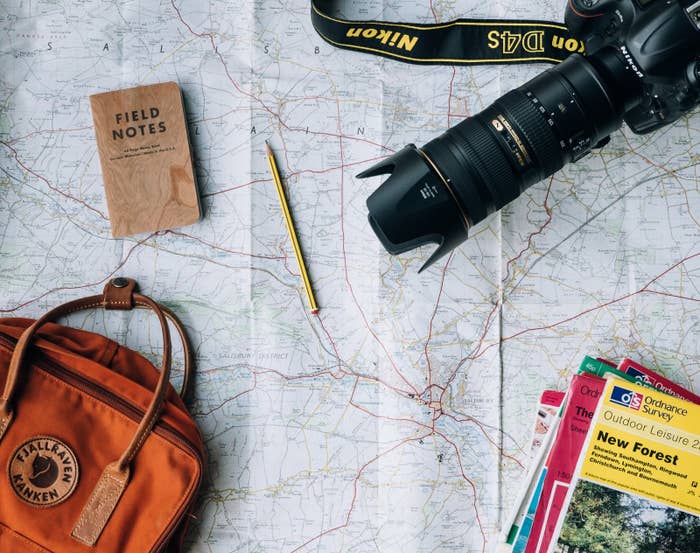In Alone Time: Four Seasons, Four Cities, and the Pleasures of Solitude, Stephanie Rosenbloom explores the joys and benefits of traveling alone. Below, some tips for anyone looking to plan the best solo vacation — from first-timers to seasoned pros.

1. Ask about “single” rooms.
Many high-end hotels in Europe have lodgings for solo travelers. Often called single rooms, they’re typically smaller than standard ones but are a way to check in to some of the nicest places for less money. One thing to keep in mind: Hotels don’t always list their single rooms under the rooms and suites section of their websites. You may have to search on a particular date to see prices and availability.
2. Track your explorations.
LiveTrekker is a free app for flâneurs with type A personalities. Go ahead and stroll wherever the day takes you, and LiveTrekker will follow along in the background, logging how far you walk and drawing a red line up and down the streets and through the gardens and museums you visit, creating a detailed, zoomable map (a satellite view allows you to see landmarks like the Eiffel Tower). You don’t need to do a thing or be connected to Wi-Fi. Just hit start before you go, and the app takes care of the rest. You can stay in the moment as you walk and explore — and at the end of the day you’ll be able to see a beautiful map of exactly where you’ve been. You can even share it with all the people who wish you had invited them along.
3. Try a tour.
Audio tour company Detour offers affordable walking tours of cities including London; Paris; Rome; New York; New Orleans; Portland, Oregon; and Savannah, Georgia. In Paris, for instance, you can take a tour of Saint-Germain-des-Prés called “The Golden Age of African-American Writers” that follows the trail of Richard Wright and James Baldwin. Not into audio tours but still want some direction? You may want to look into self-guided walking tours from companies like Country Walkers, which include maps, itineraries, luggage transfers, breakfasts, and some other meals.

4. Practice the local language.
Duolingo turns language learning into a game of multiple-choice questions, word-matching quizzes, and writing and speaking translation challenges. If you answer correctly, you proceed to the next level. It’s language learning you can do at home or on the fly — waiting in line at the grocery store or on an airplane. The more you learn, the more virtual currency you receive, which you can use to unlock bonus lessons, like how to flirt in French. A better use of your time than Candy Crush Saga? Evet, as they say in Turkish.
5. Download Google Translate.
With the Google Translate app you can converse with Japanese taxi drivers and order dinner in Italian, even if you don’t speak either language. The app can be used in a variety of ways. Consider the camera icon: Just tap it and hold your phone over a menu to see a virtual-reality translation, or take a snapshot of the text you’re looking at and the app will translate it. You can also get translations of words that you speak, type, or draw on your smartphone screen with your finger.
6. Meet up with other solo travelers.
Context Travel offers private or group walking tours (for no more than seven people) in cities around the world led by scholars with advanced degrees. Overseas Adventure Travel caters to travelers over 50 with small-group itineraries and has seen the number of solo travelers mushroom in recent years. The company expects that soon about half of its travelers will be solos. In 2016, Intrepid Travel began offering solo-only tours. Its popularity led the company to offer half a dozen solo-only departures to places like Bali and Morocco in 2018. Road Scholar, at www.roadscholar.org, specializes in educational trips and offers solo travelers their own rooms for no supplemental charge.
7. Book a meal with a local host.
Peer-to-peer apps and websites like EatWith, Withlocals, and Feastly enable you to book meals with local hosts in a matter of minutes. Some hosts are even professional chefs. Feastly, for instance, is entirely made up of them.
Some hosts cook for two or three people; others for half a dozen. So you may not be dining only with the chef, but perhaps with his or her spouse, as well as with other travelers or even locals in the mood for a home-cooked meal. You can find meals for $35 or for $135, depending on factors like the food being served, the location, and the chef’s experience. Some sites, like Feastly, don’t just have shared meals at the cook’s home but also offer them at pop-up locations, farms, and other large venues.

8. Be in the moment.
Digitally distracted? Freedom will block websites and apps on your smartphones, tablets, and computers to help you stay present and focused.
9. Learn about local customs and laws.
The U.S. State Department offers information about cultural norms, laws, crime, health considerations, visa requirements, embassy locations, and the use of drugs and alcohol for countries around the world at travel.state.gov. The site also has additional tips for specific kinds of travelers, including women, people with disabilities, and LGBT travelers.
Several websites offer more detailed information for LGBT travelers, including the International Lesbian, Gay, Bisexual, Trans and Intersex Association (ILGA), which has maps that chart where criminalization, protection, and recognition laws exist.
10. Stay safe.
If you’re a United States citizen, one of the easiest things you can do is register your trip (for free) with the Smart Traveler Enrollment Program, known as STEP. Doing so enables citizens and nationals to receive emails from the nearest embassy about safety conditions in your destination country so you can make up-to-the-minute decisions about your travel plans. It also enables the embassy or consulate to contact you in an emergency in the event of a natural disaster or civil unrest. Additionally, while you should limit what you post publicly on social media, keeping a close friend or family member in the loop about where you are and when you’ll check in is a smart idea.
From Alone Time by Stephanie Rosenbloom, published by Viking, an imprint of Penguin Publishing Group, a division of Penguin Random House, LLC. Copyright © 2018 by Stephanie Rosenbloom.
For more information on Alone Time click here.

